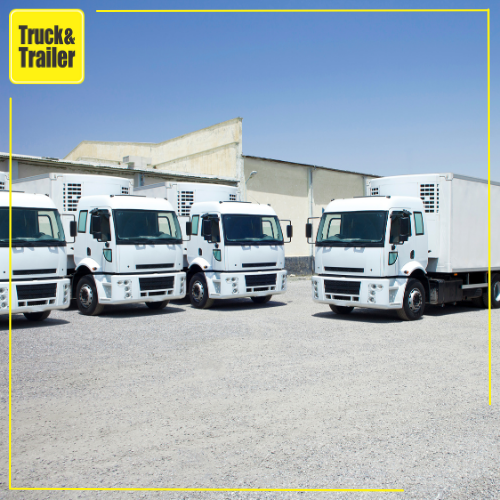
Electric Trucks and Sustainable Transport in the Trucking Industry
Date: 27/09/2023
In an era where sustainability is paramount, the truck and trailer industry is undergoing a remarkable transformation with the introduction of electric trucks. These vehicles are revolutionising the way goods are transported, with a focus on reducing emissions and operating costs. To keep you updated with the latest developments in this exciting sector, we'll delve into the cutting-edge technologies, evolving regulations, and market trends surrounding electric trucks. Now, find the right truck for your specific requirements for hire on Truck & Trailer.
 Photo by Vectorjuice on Freepik
Photo by Vectorjuice on Freepik
Electric Trucks: Pioneering Sustainability and Efficiency
Electric vehicles are at the forefront of the industry's shift towards a more sustainable future. As businesses worldwide seek ways to reduce their carbon footprint, these vehicles offer a promising solution. They leverage electric propulsion systems to power heavy-duty trucks, paving the way for greener logistics and reduced dependency on fossil fuels. But what's driving the rapid adoption of these trucks?
Environmental Benefits: Electric trucks produce zero tailpipe emissions, curbing air pollution and contributing to cleaner cities. The reduction in greenhouse gas emissions aligns with global climate goals and offers a more sustainable way to transport goods.
Lower Operating Costs: Although the initial purchase price is higher, the trucks offer lower operating costs. Reduced fuel expenses, fewer maintenance requirements, and government incentives make them an attractive investment.
Technological Advancements: Continuous advancements in battery technology have extended the range and charging speed of these type of trucks. This ensures they are well-suited for long-haul transportation, breaking down previous limitations.
Regulatory Support: Governments are increasingly introducing regulations to limit carbon emissions, driving companies to adopt EV trucks or hybrid options. These regulations encourage the industry to shift toward eco-friendly alternatives.
Market Expansion: The market for these kind of trucks is expanding rapidly, with a growing number of manufacturers offering a variety of models. As competition intensifies, innovation and affordability are likely to improve.
The Road Ahead: What to Watch for in the Electric Truck Industry
As we look ahead, there are several key areas to watch within the electric vehicle industry. These trends and developments will continue to shape the landscape of the truck and trailer industry in the coming years:
Battery Innovations: Battery technology is evolving rapidly, leading to increased energy density and reduced charging times. Keep an eye on developments in battery chemistry and infrastructure to assess the impact on the truck capabilities.
Charging Infrastructure: The expansion of charging networks, both for short-haul and long-haul trucking, is crucial for the widespread adoption of the trucks. Look for news on charging station growth and innovations in charging technology.
Fleet Electrification: More companies are committing to electrify their fleets, impacting the adoption rate of electric trucks. Follow the stories of major logistics companies and their electric vehicle procurement strategies.
Policy Changes: Government policies and incentives will continue to play a significant role in the growth of the electric vehicle market. Be vigilant for updates on regulations, subsidies, and tax incentives that could impact the industry.
Market Competition: The competition among manufacturers is driving innovation and pushing down costs. Compare different electric truck models and their features to make informed decisions.
Environmental Impact Studies: Ongoing research on the environmental benefits and drawbacks of the trucks will provide valuable insights into their real-world impact on sustainability.
Tips for Navigating the Electric Truck Industry:
1. Know Your Needs: Evaluate your specific operational requirements to determine the type and range of electric trucks that best suit your business. These trucks come in various sizes and capabilities, so understanding your needs is crucial.
2. Charging Infrastructure Planning: Plan your routes around charging infrastructure. Familiarize yourself with charging station locations, both along highways and within your depot. Efficient route planning can help minimise downtime during charging.
3. Total Cost of Ownership (TCO): Consider the long-term cost savings associated with electric vehicles. While the initial purchase price may be higher, lower operating costs, including reduced fuel expenses and maintenance, can lead to a favorable TCO over time.
4. Regulatory Compliance: Stay informed about regional and national regulations regarding emissions, incentives, and electrification goals. Complying with these regulations can open doors to subsidies and incentives.
Benefits of Electric Trucks:
Environmental Impact: These type of trucks produce zero tailpipe emissions, contributing to cleaner air and reduced carbon footprint, which is essential for meeting sustainability goals.
Operational Efficiency: Electric motors offer instant torque, providing smooth acceleration and better control, making them well-suited for urban deliveries and long-haul routes.
Cost Savings: Lower operating costs, including reduced fuel expenses and less maintenance, lead to significant savings for businesses over time.
Quiet Operation: Electric vehicles are notably quieter than their diesel counterparts, reducing noise pollution in urban areas, particularly during night-time deliveries.
Steady Advancements: The electric motor industry is in constant evolution, leading to improvements in battery technology, charging infrastructure, and vehicle design.
Interesting Facts about Electric Trucks:
First Electric Trucks:
Electric trucks are not a recent innovation. In fact, electric trucks were used in the early 20th century before the dominance of internal combustion engines.
Tipping the Scales:
Electric trucks' weight distribution differs from traditional trucks due to the weight of the battery packs. Manufacturers are working on optimizing weight distribution for improved stability and handling.
Range Variability:
The range of electric trucks varies significantly based on the type and size of the battery. Short-range models may be ideal for urban deliveries, while long-haul options are designed to cover hundreds of miles on a single charge.
Electric Semi-Trucks:
Leading companies are developing electric semi-trucks, proving that electric propulsion can handle the demands of heavy long-haul transportation.
Global Adoption:
Electric trucks are not limited to one region. They are being adopted worldwide, with major companies in Europe, North America, and Asia investing heavily in their development.
The truck and trailer industry is at a pivotal moment, with electric trucks leading the way towards a more sustainable and efficient future. As we witness this transformation, staying informed about the latest technologies, regulatory changes, and market trends in the electric truck sector is essential. With the promise of environmental benefits, cost savings, and ongoing technological advancements, electric trucks are set to reshape the industry and drive us towards a greener, more eco-conscious era of transportation. Stay tuned for more updates on this electrifying trend. On Truck & Trailer, you may hire the ideal truck for your particular needs.







